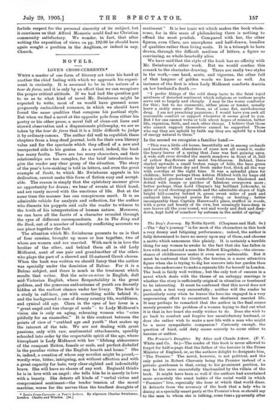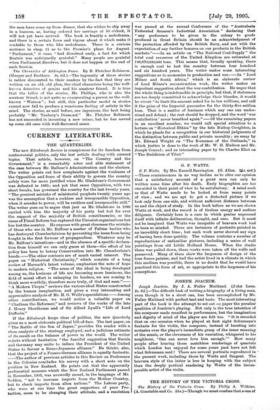LOVE'S CROSS-CURRENTS.*
NOVELS.
WHEN a master of one form of literary art tries his hand at another the chief feeling with which we approach his experi- ment is curiosity. It is assumed to be in the nature of a tour de force, and it is only by an effort that we can recapture the proper critical attitude. If we had had the question put to us as to what kind of novel Mr. Swinburne might be expected to write, most of us would have guessed some gorgeously embroidered romance, in which we should have found the same qualities that compose his poetical style. But when we find a novel at the opposite pole from either his poetry or his other prose, a novel full of clean-cut lines and shrewd observation and a dispassionate philosophy, we are so taken by the tour de force that it is a little difficult to judge it by ordinary canons. The author did well to republish these chapters from a long-dead journal, both for their own literary value and for the spectacle which they afford of a new and unexpected side to his genius. As a novel, indeed, the book has many faults. There are too many characters, and their relationships are too complex, for the brief introduction to give the reader any clear grasp of the situation. The story of the year's love-making is told in letters, and even the great example of Scott, to which Mr. Swinburne appeals in his dedication, cannot make this form of fiction easy and accept- able. The reason is simply that the epistolary manner gives no opportunity for drama; we hear of events at third hand, and are rarely moved with the emotions of life. But at the same time the manner has one conspicuous merit. It is an admirable vehicle for analysis and reflection, for the author who dissects his puppets and calls the reader to witness to the truth of his interpretation of human nature. Moreover, we can have all the facets of a character revealed through the eyes of different correspondents. As in The Ring and the Book, out of a number of honestly conflicting accounts we can piece together the fact.
The situation which Mr. Swinburne presents to us is that of four cousins, brought up more or less together, two of whom are women and are married. With each is in love the brother of the other, and behind them all is old Lady Midhurst, aunt of one pair and grandmother of the other, who plays the part of a shrewd and ill-natured Greek chorus. When the book was written we should fancy that the author was specially under the dominion of Balzac. For it is a Balzac subject, and there is much in the treatment which recalls that writer. But the mise-en-scene is English, dull mid-Victorian English, where Respectability is the great goddess, and the generous enthusiasms of youth are decently hidden at the earliest chance under her livery. The book is a study in calf-love, yet with something noble behind it; and the background is one of dreary country life, worldliness, and cynical old age. Clara in the eyes of her lover is a "great angel and has charge of souls " : to Lady Midhurst's vision she is only an aging, scheming woman who "cries pitifully for an enameller." It is this contrast between the points of view of "crabbed age and youth" that makes up the interest of the tale. We are not dealing with great passions, only with raw, sentimental attachments, speedily schooled into order by the respectable spirit of the age, whose hierophant is Lady Midhurst with her "lifelong abhorrence of the rampant Briton, female or male, and perfect disbelief in the peculiar virtue of the English hearth and home." She is, indeed, a creation of whom any novelist might be proud,— wordly-wise, bitter, intriguing, not without affection and with a great capacity for hate, very clear-sighted and indomitably brave. She will have no shams of any sort. Reginald thinks he is in love with an angel: she tells him he is merely in love with a beauty. She detests all kinds of "verbal virtue and compromised sentiment—the tender tension of the moral machine, worse for the nerves than the headiest draughts of * Love's Cross-Currents: a Year's Letters. By Algernon Charles Swinburne. London Ghetto and Windua Os.]
sentiment." It is her tonie wit which makes the book whole- some, for in this maze of philandering there is nothing to offend the most prudish. Compared with her, the other figures, even Clara, are amorphous and half-drawn, bundles of qualities rather than living souls. It is a triumph to have drawn, through the difficult medium of letters, a figure so convincing, so whole-heartedly alive.
We have said that the style of the book has no affinity with Mr. Swinburne's other work. But we would confine this remark to the character-drawing. There are really two styles in the work,—one hard, acute, and vigorous, the other full of that languor of golden words we know so well. An instance of the first is when Lady Midhurst comforts Amicia on her husband's death :— "I prefer things of the cold sharp taste to the faint tepid mixtures of decocted sentiment which religious or verbose people serve out so largely and cheaply. I may be the worse comforter for this ; but to me comments, either pious or tender, usually leave a sickly sense after them, as of some flat, unwholesome drug. I am not preaching paganism ; I would have you seek all reasonable comfort or support whenever it seems good to you. But 1 for one cannot write or talk about hopes of reunion, better life, expiation, faith, and such other things. I believe that those who cannot support themselves cannot be supported. Those who say they are upheld by faith say they are upheld by a kind of energy natural to them."
In the second we recognise a familiar hand :—
" This was a little old house, beautifully set in among orchards and meadows, with abundance of roses now all round it, under the heavy leaves of a spring that June was fast gaining upon. A wide soft river divided the marsh meadows in front of it, full of yellow flag-flowers and moist fen-blossom. Behind, there started upwards a small broken range of hills, the bare green windy lawns of them dry and fresh under foot, thick all the way with cowslips at the right time. It was a splendid place for children ; better perhaps than Ashton Mildred with its huge old brick-walled gardens and wonderful fruit-trees blackened and dotted with lumps or patches of fabulous overgrown moss ; better perhaps than Lord Cheyne's big brilliant Lidcombe, in spite of royal shooting-grounds and the admirable slopes of high bright hill-country behind it, green sweet miles of park and embayed lake, beyond praise for riding or boating ; better incomparably than Captain Harewood's place, muffled in woods, with a grim sad beauty of its own, but seemingly knee-deep in sere leaves all the year round, wet and weedy and dark and deep.. down, kept hold of somehow by autumn in the midst of spring.'
The Day's Journey. By Netta Syrett. (Chapman and Hall. 6s.) —The "day's journey" is for most of the characters in this book a very dreary and fatiguing performance ; indeed, the author is fully determined to have no mercy upon any of them, and chooses a motto which announces this plainly. It is certainly a terrible thing for any woman to awake to the fact that she has fallen in love with and married a man like Robert Kingslake,—the circum- stance of childlessness makes it even more unbearable. But it must be confessed that Cicely, the heroine, is a more attractive figure when she is trying to dig her sorrows into her garden than when she endeavours to make a separate life for herself in London. The book is fairly well written ; but the only test of success in a novel which deals with the theme of an unhappy marriage is whether the story is sufficiently origin al in situation or treatment to be interesting. It must be confessed that this novel does not pass such a test very successfully ; neither will the reader be particularly sorry when he leaves the hero ins engaged in a very unpromising effort to reconstruct her shattered married life. It may perhaps be remarked that the author in the final scenes merely presents the problem of a woman trying to find out what it is that in her heart she really wishes to do. Does she wish to go back to comfort and forgive her unsatisfactory husband, or does she rather wish to make a new life with a man who might be a more sympathetic companion ? Curiously enough, the question of hard, cold duty seems scarcely to occur either to heroine or author.
The Premier's Daughter. By Alice and Claude Askew. (F. V. White and Co. 6s.)—The reader of this book is never allowed to forget for half-a-page that the father of the heroine is the Prime Minister of England, or, as the authors delight to designate him, "The Premier." The novel, however, is not political, and the only point in Robert Chevenix being the Premier instead of a private gentleman is that, owing to his prominent position, he may be the more successfully blackmailed by the villain of the book. It might have been as well if the authors had ascertained more accurately the exact habits of the social world in which "Premiers" live, especially the hour at which that world dines. It detracts from the accuracy of the book that a lady who is dining at a specially smart party at the Premier's hou se should say to the man to whom she is talking, some times pp arently after the men have come up from dinner, that she wishes to slip away in a hansom, as, having ordered her carriage at 10 o'clock, it will not yet have arrived. The book is frankly a melodrama, and there is a certain force and vigour about it which make it readable to those who like melodrama. There is a curious sentence in chap. 21 as to the Premier's plans for August. "Parliament," it runs, "had dissolved early, a fact for which Be,atrix was unfeignedly grateful." Many people are grateful when Parliament dissolves, but it does not happen at the end of each Session.
The Chronicles of Addington Peace. By B. Fletcher Robinson. (Harper and Brothers. 3s. Od.)—The ingenuity of these stories is rather discounted to their readers by the fact that they are written on an old, old plan, the chief characters being the well- known detective of genius and his amateur friend. It is true that the teller of the stories, Mr. Phillips, who is also the amateur friend, is not quite so exasperating a person as the well- known " Watson " ; but still, this particular model in stories cannot now fail to produce a wearisome feeling of satiety in the mind. The stories, as said before, are ingenious, the best being probably "Mr. Taubery's Diamond." Mr. Fletcher Robinson has not succeeded in inventing a new crime, but he has served up some old ones with well-flavoured sauce.







































 Previous page
Previous page